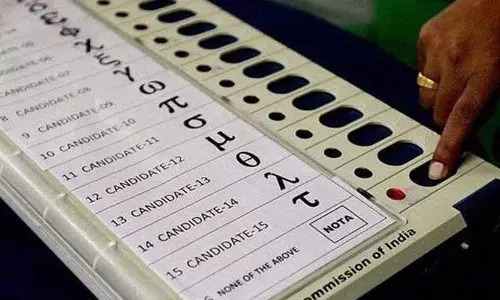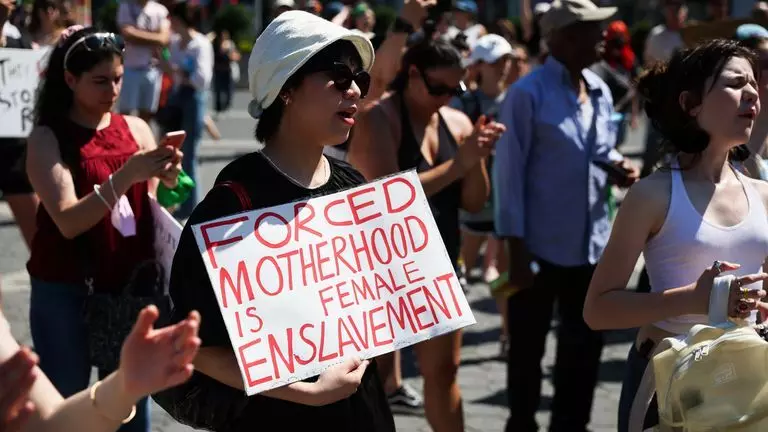
Low-income women in US targeted by Google with anti-abortion pregnancy centers ads: Study
text_fieldsResearchers at the Tech Transparency Project have discovered that low-income women in some cities are more likely than their wealthier counterparts to be targeted by Google advertising promoting anti-abortion crisis pregnancy centres when they search for abortion services.
The study expands on earlier results that show how Google refers people looking for abortion services to so-called crisis centres, which have been known to pose as abortion clinics in an effort to discourage women from getting an abortion.
The researchers created test accounts for women from three distinct income groups provided by Google in the cities of Atlanta, Miami, and Phoenix, Arizona: average or lower income rate, moderately high-income rate, and high-income rate. They then typed in search terms like "I want an abortion" and "abortion clinic near me." In Phoenix, crisis centres accounted for 56% of the search advertising delivered to test accounts representing low- to moderate-income women, compared to 41% for test accounts with relatively high incomes and 7% for high-income accounts. Crisis pregnancy centres were advertised in 42% of ads displayed to Atlanta's lower-income group, compared to 18% for moderately high-income women and 29% for high-income women.
Abortion is prohibited beyond 15 weeks of pregnancy in Arizona and Florida. Georgia prohibits it after six weeks, however, at that time, many women are unaware that they are pregnant.
“By pointing low-income women to [crisis pregnancy centres] more frequently than higher-income women in states with restrictive laws, Google may delay these women from finding an actual abortion clinic to get a legal and safe abortion,” says Katie Paul, the director of the Tech Transparency Project.
“The time window is critical in some of these states,” she adds.
Women with lower incomes are the least likely to be able to travel for abortion treatment because doing so might cost thousands of dollars in lost wages, travel expenses, childcare costs, and lodging costs.
“Lower-income women are being targeted, and they’re the ones that are going to suffer the most under these policies,” Paul says.
Not all cities experienced the same outcomes. In contrast, higher-income women in Miami were more likely to see advertisements from crisis centres than lower-income women. Although the researchers admit they do not know for sure why Miami differed from the other locations, they assume that crisis pregnancy clinics may actively target low-income women in states with more stringent laws. (Arizona and Florida both prohibit abortion beyond 15 weeks, though Arizona's ban is more stringent.)
Pregnancy crisis centres have a reputation for using dubious methods to persuade women seeking abortions to keep their pregnancies, even while they do provide supplies for pregnant women like diapers and pregnancy tests. These include pretending to be abortion clinics online when they actually do not provide abortion care, refusing to give women who claim they want abortion access to pregnancy tests and promoting dubious research regarding abortion treatment to clients. Low-income women are frequently the focus of crisis centres, which are notorious for targeting them since they find it more difficult to go out of state for abortion care despite providing medical services, the Guardian reported.
Paul adds that many consumers won't be aware they are being targeted by Google in this way, even though businesses buying advertising with Google can choose which groups they wish to reach, including by income.
“Google has a large share of influence, particularly in the United States when people are trying to search for authoritative information. And people generally tend to consider Google’s search engine as an equaliser. They think the results they get are the results that everyone’s going to get. But that’s just not the case,” Paul says.
After a Tech Transparency Project investigation revealed that Google was showing individuals ads for pregnancy crisis centres that implied they offered abortions even though they did not, the firm came under fire for breaking the platform's guidelines on misleading advertisements.
Google has received numerous requests to modify its search engine to address these problems. In two letters to the firm in 2022, Senator Mark Warner of Virginia and Representative Elissa Slotkin of Michigan urged the business to cease sending users of Google Maps looking for abortion treatment to these crisis facilities. The legislators also demanded that Google place restrictions on crisis centres' visibility in search results and advertisements and add disclaimers that make it obvious whether a search result is an abortion-related organisation or not.
In response, Google promised to designate these features in the future in a straightforward manner. However, the study's researchers also discovered that consumers were still being shown a number of adverts that falsely suggested centres provided abortion care.
In Phoenix, a Google search for "Abortion fund"—an organisation that offers financial and other types of help for abortions—resulted in an advertisement for a crisis centre with the wording "Free Abortion Help - 100% Confidential."
Similar to this, when the lower- or average-income Atlanta test account searched for "Planned Parenthood Atlanta," Google only displayed one result that read "Abortion Consultation for Free," with an ad referring to a crisis pregnancy clinic in Atlanta called Health for Her. While several of the ads in the Tech Transparency Project study had a label that read, "Does not provide abortions," this one and numerous others did not, in violation of Google's own labelling guidelines.
























